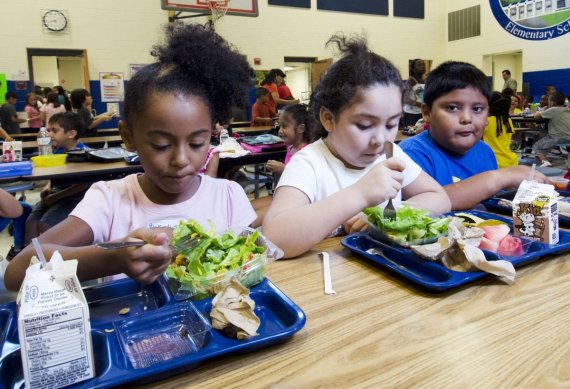Photo: U.S. Dept of Agriculture
When schools provide a warm meal it will ensure that children will eat vegetables at least once a day, says Rinnooy Kan, chairman of the national team ‘food skills’ and involved in the project ‘everything is healthy’. ‘In many countries a warm school lunch is perfectly normal. In the Netherlands we are an exception’, he told the audience.
Alexander Rinnooy Kan
Does this not remove the responsibility and ownership of the parents, someone in the audience reacted. Partially, Rinnooy Kan said, but ‘it is quite a challenge for parents to provide three healthy meals a day for their children. The temptation to choose for unhealthy alternatives is great.’ Moreover: ‘We also do not say: teach your own child how to read and write. That responsibility is also shared between parents and the school.’
Less than half of the attendants at the symposium saw a future for the warm school lunches. Professor Jaap Seidell (Vrije Universiteit Amsterdam) knew why. ‘Parents say: if my child eats a warm meal during lunch, then he won’t eat in the evening. Of course this is not true.’ But because he knows that in the Netherlands not many people eat a warm lunch, he said: ‘It does not have to be a warm meal. A healthy lunch with a salad or raw vegetables is also possible.’
Jaap Seidell
Seidell explained that only one percent of the children in the Netherlands eat the recommended amount of vegetables. ‘This is because nobody eats vegetables with breakfast or lunch. The whole 150 grams – and 200 grams for adults, which also almost nobody achieves – thus has to be present during dinner. Can you imagine it? A child with a plate full of vegetables? This does not work?’
The speakers also had a strong opinion on the fear of patronizing. Both sneered at minister Edith Schippers (public health) who believed that people can determine for themselves what they put in their mouth. ‘You could also say: people can determine for themselves what they put in their head. If you view it in such a way, education is also not really important’, Rinooy Kan mocked.
The ‘taste lessons’, which was started by Wageningen UR in 2006, was evaluated by PhD candidate Marieke Battjes-Fries. She concluded that this programme does teach children about healthy food, but that it does not directly affect their behaviour. She defended her thesis last Friday.
State secretary Martijn van Dam (Economic affairs) indicated, during a visit to Wageningen UR, that he was supporter of the ‘taste lessons’.
Learning about vegetables does not affect eating behaviour
AanTafel! helps against child obesity



